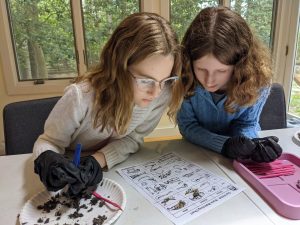Why Homeschool? 3 Reasons to Embrace the Lifestyle
When people learn that I have always homeschooled my kids, “Why?” is almost always the first question. After the first several times of stumbling through a description – neurodiversity, children lost in the shuffle of a classroom of 30 pupils, and wanting to maintain a close relationship with my young child as she developed her values and worldview – I decided I needed a more concise answer. That’s when I came up with the 3 F’s. We made the jump to homeschooling in kindergarten, and I now have 6th and 7th graders, and the 3 F’s are still as valid today as they were that first day of kindergarten.
The reasons I homeschool are the 3 F’s: freedom, flexibility, and family time.
Freedom
Have you ever sat in a school car line for 30 minutes? Every day? It’s painful. I don’t know why there aren’t better systems put in place, but after a year of rushed mornings and car line pick-ups and drop-offs for preschool, I was so thankful to put it behind me years ago.
When you homeschool, your days belong to you. I used to call it “life without alarm clocks” because you choose when you get up. But it’s so much more than that. You also decide how to educate your children and what they will learn. Do you have an animal enthusiast? Your kid can volunteer during the day at a shelter or start a pet sitting business. What about art or animation fans? They can spend their days trying out new software, breaking in new art supplies, watching how-to videos, and creating. You can completely personalize your child’s education. Public schools cannot do that. No matter how many electives they offer, they will never be able to match the breadth of options you can provide.
Maybe you have a competitive athlete in your household whose training schedule is better served by homeschooling. Perhaps you have a budding entrepreneur who spends hours honing their craft and developing a business plan. Maybe your member of 4-H is spending hours raising and training animals. Each of these kids has the freedom to pursue their passions, without overscheduling and burning out, because of homeschooling!
Flexibility
Flexibility in both scheduling and curriculum is a huge perk of homeschooling. The flexibility to schedule not only your days but your year makes a big difference. If your child is a night owl, they can work on schoolwork late at night and sleep in the following day. If you decide you all need a break on Wednesday, you can move the work to a different day. If you choose to take a vacation in mid-September, when most school kids sit at desks and stare at a board, your family can be off having adventures. You can choose to school year-round or create your schedule. Six weeks on, one week off, extended breaks around holidays, summers off? They’re all an option. You can choose to do school for a few large chunks of time or many small study sessions. Or you can take a more relaxed approach and “unschool.”
In our house, we follow a routine because that’s what works best for us, but I learned early on to ignore the clock as we work. New homeschoolers often write out tidy little schedules: Math: 8-9 AM, Social Studies: 9-10 AM, and so on. These homeschoolers usually throw that rigidity out the window as they discover that timed schedules are irrelevant when learning is happening more organically. You can spend 2 hours looking at microscope slides, and it’s not a problem—it’s wonderful. You can set aside the history workbook and instead take a field trip to the battlefield down the road or watch a 2-hour documentary. You can immerse yourself in all these experiences guilt-free because you aren’t held to a timetable.
In addition to all this daily and yearly schedule flexibility, you can be flexible with your curriculum. In public school, if the class is using a math book that is difficult for your child to understand, the teacher isn’t typically able to give your child a different book instead. But you can. I know people that have changed math curricula six times in a quest to find one that helps it “click” for their kid. You have the flexibility to change what your kid studies, how they study it, and when they study it. You can even turn over those decisions to them or collaborate to find the best fit for your family.
Family Time

Most of us are only going to have our kids at home for 18 years. Maybe you’ll have a few years after that if they stay at home during college or career training. That time together is precious. Those years are instrumental in building relationships, teaching values, fostering trust, and continuing to teach them skills that they don’t learn in a classroom setting. Some families keep their kids home to allow for spiritual studies during the academic day. Others find that their work schedule is such that they would never see their kids if they were public school students. Homeschooling provides families time together. Homeschooled siblings often develop closer relationships than their public school counterparts because they spend so much time together.
Families find extra time together not only during academics but, as I mentioned above, in the open vacation calendar. No more waiting for spring or summer break to travel out of town. If you want to visit grandparents before Thanksgiving break, you can. If you want to visit popular tourist destinations, you can do it in the off-season, keeping prices, and crowds, down. The savings are excellent, but the time…the time together is priceless.
Family time extends to field trips. Public schools usually take a handful of trips each year, but you can take that many in a week. I counted one year, and we made more than 70 trips that would have required a signed permission slip if the kids had been in public school, everything from aquariums to sculpture gardens, history reenactments to factory tours. These are the experiences that make the learning come alive, and you get to be present for them with your child!
The sibling relationships grow as they teach and learn from one another during this time together. Older siblings strengthen understanding as they explain concepts and learned material to their younger siblings. Younger siblings spark curiosity in older siblings as they show them how to look at things from a different point of view. This increased family time allows not only for stronger sibling bonds but also for more in-depth, cooperative learning.
I have never seen education as one-size-fits-all, and people homeschool for a wide variety of reasons (I’ve seen lists with 100+ entries), but these are the reasons I homeschool.
Feel free to use them the next time someone asks, “But…why?”
Elizabeth Caraway recently moved to Virginia from Ohio. She served as the homeschool outreach program founder and director for a local nursing home for four years and helped facilitate another local group of 500+ homeschoolers. She has also taught homeschool group French classes and participated in homeschool cooperatives. Liz is a graduate of the U.S. Air Force Academy, where she later taught in the Dept of English, and the University of Delaware, where she earned an M.A. in English Literature. An Air Force veteran, Liz enjoys acrylic painting, time in nature, and travel. She lives in Sterling, VA, with her two daughters and computer nerd husband.
Opinions expressed by individual writers in this blog do not necessarily reflect the views of the Board of Directors of The Organization of Virginia Homeschoolers, nor do they represent an official position of VaHomeschoolers. Writers’ views are their own, and readers are encouraged to research and explore homeschooling issues to their own satisfaction.
